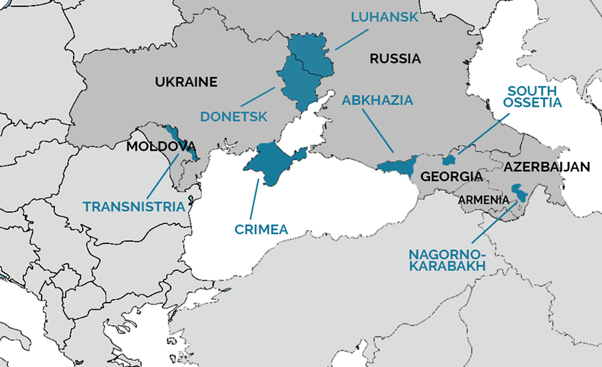Highlight 26/2024 – Revising the EU’s Role in Security Dimension of Eastern Partnership Countries
Tamari Tabatadze, 17 July 2024

The Eastern Partnership (EaP) is a component of the European Neighborhood Policy (ENP) comprising the EU and seven countries: Armenia, Azerbaijan, Belarus, Georgia, the Republic of Moldova, and Ukraine. The region faces significant security challenges, often referred to as a security deficit, stemming from protracted conflicts, hybrid threats, and deficiencies in national security structures. Notably, five out of the six EaP countries, excluding Belarus, are contending with unresolved territorial disputes or non-recognized entities on their territory, in which Russian troops are directly or indirectly involved. The war in Ukraine, unresolved conflicts in Nagorno-Karabakh, the Donbas, Transnistria, Abkhazia, and South Ossetia, coupled with instability in Belarus, have implications not only for regional stability but also for Europe and the broader international community.
Over the past ten years, the EU has increased its support for reforming the security sector in Eastern Partnership countries. This aims to enhance the capabilities of security institutions and civil society groups. The main emphasis has been on non-military aspects, particularly improving the effectiveness of prosecutors, the judiciary, and law enforcement agencies. The Association Agreements and DCFTA signed with Georgia, Moldova, and Ukraine signify both political and economic cooperation efforts. These agreements aim to foster stability and security within the EaP area by highlighting the interconnectedness of security, development, and democracy. Since the early 2000s, the EU has initiated three civilian CSDP missions to Moldova, Ukraine, and Georgia. Under the leadership of the French presidency, the EU played a pivotal role in mediating a ceasefire during the 2008 Russia-Georgia Five-Day War. The EU promptly set up the EUMM and initiated the Independent International Fact-Finding Mission on the Conflict in Georgia. These actions enhanced the EU’s credibility as a security player.
However, the EU’s participation in managing and resolving long-standing conflicts remains restricted. Due to a lack of political consensus, the EU has opted for limited engagement in security sector assistance. Consequently, this creates a scenario where Russia can exploit a deteriorating security environment to assert its influence on its own terms, positioning itself as indispensable. The suitability of the EaP framework for engaging in security and defense cooperation remains a subject of debate. Some, including France and other nations hesitant to provoke Russia, believe that by avoiding involvement in the security sector, Europe can prevent Russia from doing so as well. Russia poses a pressing threat to EaP countries by either using force or threatening to do so. It employs hybrid warfare tactics to destabilize and exert influence over the region. If Russia succeeds in its regional goals, the EU’s own objectives will be unattainable. Therefore, EU’s self-restraint approach allows Russia to exploit weaknesses in hard security while the EU concentrates on softer issues.
The Russian military invasion of Ukraine has fundamentally shifted the dynamics in Eastern Europe. The strong interconnection between EU security and the security and stability of Eastern Partnership (EaP) countries has been underscored. The EU opened accession negotiations with Ukraine and Moldova and granted candidate status to Georgia, clearly challenging Russia’s assertions of privileged influence over those countries. The present security landscape paves the way for increased cooperation between the EU and NATO to reinforce stability and security in Eastern Partnership countries. NATO, along with EaP nations and the EU, have mutual interests in closely working together to address strategic, operational, and tactical vulnerabilities, and to boost their combined resilience in confronting security threats. A unified strategy can complement the EU’s ongoing endeavors to enhance European security and defense capabilities.
Tamari Tabatadze, Highlight 26/2024 – Revising the EU’s Role in Security Dimension of Eastern Partnership Countries, 17 July 2024, available at www.meig.ch
The views expressed in the MEIG Highlights are personal to the authors and neither reflect the positions of the MEIG Programme nor those of the University of Geneva.
